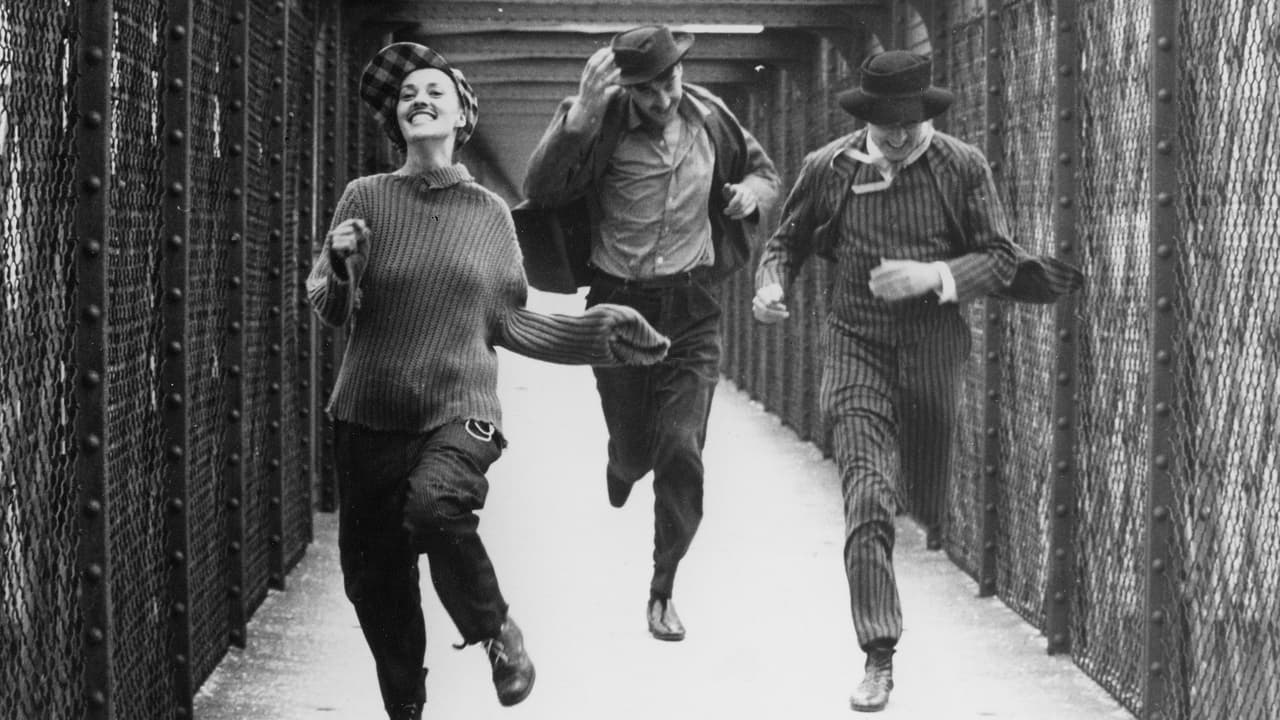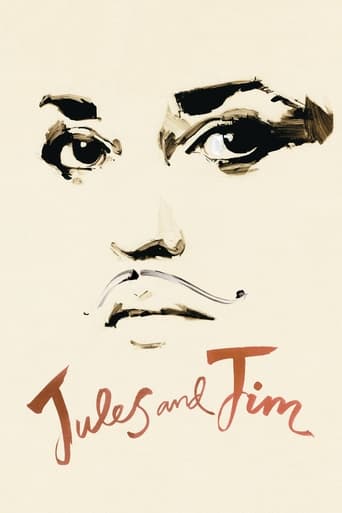oOoBarracuda
Jules (Oskar Werner), an introspective Austrian and Jim (Henri Serre) a confident Frenchman begin a friendship that defies understanding. What begins as an exchange and discourse over art develops into a bond that seems able to withstand anything, including fighting against each other in WWI. After the war has ended, the duo goes on sharing art and women with each other, until Jules falls in love with Catherine (Jeanne Moreau), a free-spirited woman with an unpredictable temperament, prone to emotional outbursts. Despite the easy-going inexperienced Jules being an odd fit for Catherine, he asks Jim not to chase Catherine, so he can have her love all to himself. Despite Jules' request, he invites Jim on many of the couple's outings and the trio spends most of their time together. Even after Catherine and Jules marry and have a child, Jim is invited to live in their home with them. Over time, an intimacy begins to develop between Jim and Catherine, which Jules is aware of. Instead of risking losing his friend or his marriage Jules allows the intimacy to blossom which creates a domino effect of emotions between the three of them. Life no longer is about what each wants individually, but rather what each other wants and expects and what kind of life they want the other to fulfill. The decision to allow the three-way relationship has enduring effects on all involved due to the complicated nature of the two men's love for Catherine, as well as their devotion to each other. Bonds will be tested, as Jules and Jim face another war, this time, off the battlefield."You said, "I love you," I said, "Wait." I was going to say, "Take me," you said, "Go away." Arguably the most memorable quote from Jules and Jim also acted as a heart-wrenching opening, conveying to the audience just how much of an emotional experience they were in for. As we are introduced to each character, Truffaut takes his deliberate time revealing what Jules and Jim mean to each other. It is Truffaut's prowess as a director that allows the audience to truly understand the depth of devotion that Jules and Jim share for each other. Without his labored efforts, the rest of the story would pass by unnoticed because this truly is a story about three people in love rather than a love triangle with each point seeking out the object of their affection. The story relies on the understanding that neither Jules, Jim, nor Catherine will seek to fulfill their own needs at the expense of each other. Technically, Truffaut showed mastery on only his third feature film. His use of freeze frames was fantastic and essential in allowing the audience to realize the profound effect on the emotional state of the men involved with Catherine, each "moved by a symbol they could not understand." Truffaut also uses the overlay technique a few times to great success, placing Catherine's face over a few scenes really driving home the idea that every thought or activity Jules and Jim ever took part in was driven by Catherine. In just three short years since his first feature, The 400 Blows--a masterpiece in its own right, Truffaut further revealed his mastery for capturing the complexity of human emotion like few others before him.Few films tackle the emotionally intense themes Jules and Jim take on. Truffaut delves into pain, the kind of pain that is caused by yearning in love. Love and lust is a theme constantly at the forefront of the film, as well, along with a precise distinction between the two. Jules, lacking the romantic experience of Jim, attempts to shield Catherine from Jim for fear that he will only lust after her. When it becomes clear that Jim actually loves Catherine, as Jules does, he relents and decides to share his love of Catherine with Jim. Jules loves Catherine and shares a devotion to Jim, so he supports a union between Jim and Catherine because he needs to be a part of each's life and wants happiness for all parties involved, and vice-versa for Catherine and Jim. Devotion, like I have never since seen replicated on screen, is the driving force behind each character's actions and thoughts. The way Truffaut managed to capture that devoted motivation shows impeccable insight to the human spirit and cements him as the purest most personal filmmaker I have ever seen. Running the gamut of emotional commentary, Truffaut also successfully illustrates loneliness, especially experienced by Catherine, and its power over life. Catherine is clearly a damaged soul, she has met and overcome many obstacles in her life, most of which, are only alluded to. There are aspects of both Jules and Jim that she depends on for her very survival, necessitating that they both remain in her life. Catherine has been unable to commit to another due to her expectation of being abandoned, as only hinted to in a couple of scenes between her and Jules. It is this damage that makes her reckless and prompts Jules and Jim to be more cautious in their interactions with her. To be able to show every unlikeable aspect of a human being, yet, still endear that person in the hearts of the audience was a skill no one in the history of cinema has been more proficient at than Francois Truffaut. By the film's conclusion, we may not have that ending that leaves each better off and happy, but what we do get is the realization that we're all in search of our statue; that one person that is perfect to us and for us despite their obvious flaws, just as Jules and Jim traversed gardens in search of their statues before they happened upon the same one, and once we find that statue, we will do whatever it takes to keep it in our view.
s-wesner1
Suphie Wesner 10/08/2012 Jules and Jim Movie Reviews, all by François TruffautThese three movies are all hall-marks of Truffaut's classically appealing style; somehow, whether in color or in black and white, Truffaut always manages to "get it right." What we mean by this is, he either chooses really charming characters who win our hearts (and minds), or he has interesting and intriguing (unusual) story-lines, or, indeed, Truffaut just simply has good ideas to write about (let's face it, though, he simply does, sometimes, use a lot of the same themes, about love, married women, and threesomes, though, not in a sexual way)... In Jules et Jim, this interesting, intriguing, film with charming characters, albeit a really downer ending and theme (kind of a Romeo and Juliet type thing; a woman scorned who goes to the last extreme to avenge herself of the death of her lover's love for her, a murder-suicide), really pulls us in with its starting premise; a lonely blond woman, named Therese, must face the facts when her abusive, drinking, though, at least politically motivated (anarchist) husband, screams at her and she considers that the last straw. In general, too, we find that the movie has a lot of good moral qualities: we see that, though this woman basically "shares" these two men, she toys with their hearts minimally, and genuine love is valued a lot. Indeed, we see that she "goes for" Jules, the German-looking Frenchman, while Jim is sort of her lover on the side. It is a complicated piece by Truffaut, set in the 1800's when trains were still all the rage, the can-can was coming to the fore of the entertainment scene, and costumes included hooped skirts, tail coats, top hats, fancy shirt cuffs, stiff bibs, wool rags, and spats... Interestingly enough, though, we see that a woman in 1800's France was not looked down upon simply for seeing two men, this was not enough to label her a "whore" in most people's eyes, or they didn't know about it, and people would not look at this situation in naive shock and disbelief, like they might in more Victorian societies. Indeed, we find that Therese, and, later , Jim's wife, Catherine, enjoys equal respect from both men, something which is indeed unusual and to be cherished by any sweet, rather innocent, and popular object of another two competing people's affection. Yes, we see through this movie, Jules and Jim, the saying "Hell hath no fury like a Woman Scorned" brought to life in no better way possible; indeed, we realize that women like men, but in a different way, really are sensitive to having their feelings or emotions for another, scorned; when she senses this, the main character, decides to try to kill her beloved, though she loves him, right then and there. For heaven's sake, the woman, in fact, did write letters like no other to her lover, Jim, professing her love to him, passionately. He would write back but there seemed always to be the unremitting circumstances which would not permit them to marry and stay together. Jules was always the simpler of the two friends, which can mean great things, that he was less of a back-stabber, for one. So, what is the reason, here? Because he will not have her love-child, as he is in difficult circumstances at the moment, married with a child, or with another child on the way. So, we soon see, that, indeed, she is crazed enough by love and remorse to want to commit murder (she is also, generally, mentally unwell, and suicidal, to boot) with her shot-gun at her side, but, instead, she takes him for a last, eerie ride, and then drives the old Model T-, or early version of a Model T-ford off the edge of a bridge and thus, kills them, both. So we then see that, indeed, their bodies are made into ash (by having their bones ground; this interesting process is shown by the film, no less), and the two lovers love made immemorial, and forced to be made immortal, forever. The film finally ends by showing German-looking Jules (I thought he had to be German when I first saw him; shows how caught-unawares I was when first sitting through this film, I had no idea at the time, even, that Jules was a French name. This took a while to sink in, for me, as the "s" is suspiciously pronounced, in fact). . . . . He is left alone with his love-child from the beautiful Bohemian-woman-turned-crazy-woman, but he looks as though he shall miss his two friends indefinitely, as these were his sole, close, bosom buddies, for a long while, and they taught him a lot about life, love, and joy. The film shows that, alas, life sometimes does go haltingly, but perseveringly, on. This tale of turn-of-the-century Paris, and, indeed, sometimes, rural France, was a real winner, and a period film, at that, not to be missed. It is high drama, and high art, all in one. Acting is done by at least one famous actress, that is to say, Jeanne Moreau, and the part played by Jim, too, at least by French audiences, is relatively well-known, Oskar Werner. Jules was just played by, HENRI SERRE.

